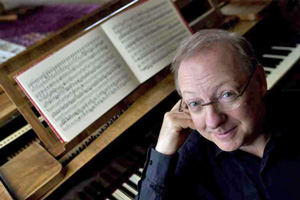

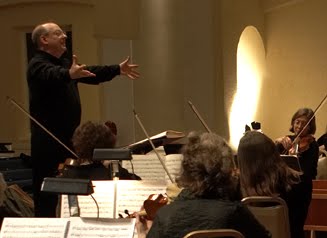 NM: Ancient music, basically. Performance practice,
I think it was called.
NM: Ancient music, basically. Performance practice,
I think it was called.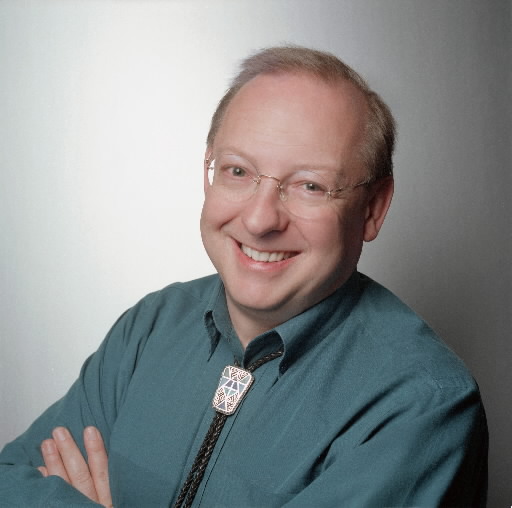 NM: No, it doesn’t. Opera goes in fashions.
For a long time it’s been singers’ opera. You hire the grand diva
— usually the bigger, the better — and you
hire a director who does his best to make everyone act around her — or him,
for that matter. Then you hire a conductor who’ll just follow him or
her, regardless. Sometimes it’s conductors’ opera, and right now it’s
stage directors’ opera. It’s Peter Sellars’s Don Giovanni, or Zeffirelli’s Turandot. The fact is, it’s conducted
by somebody, it’s staged by somebody, it’s designed by somebody, it’s performed
by a lot of people, and somebody wrote both the words and the music!
It should ideally be an absolute balance; of course, it never is.
NM: No, it doesn’t. Opera goes in fashions.
For a long time it’s been singers’ opera. You hire the grand diva
— usually the bigger, the better — and you
hire a director who does his best to make everyone act around her — or him,
for that matter. Then you hire a conductor who’ll just follow him or
her, regardless. Sometimes it’s conductors’ opera, and right now it’s
stage directors’ opera. It’s Peter Sellars’s Don Giovanni, or Zeffirelli’s Turandot. The fact is, it’s conducted
by somebody, it’s staged by somebody, it’s designed by somebody, it’s performed
by a lot of people, and somebody wrote both the words and the music!
It should ideally be an absolute balance; of course, it never is.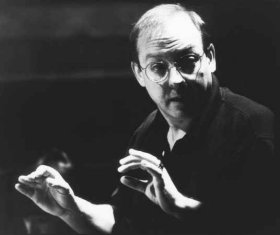 NM: Yes, where I can. In San Francisco I’ve
done a few things in Davies Hall, which is a marvelous place if they ever
decide to revive some of the more bestial Roman sports! It holds about
three thousand people, and you couldn’t hear the screams, but it’s not one
of the great halls for music. It’s the old problem where you let economists
loose on designing buildings for the arts, and they say, “You’ll never pack
enough people in for Judy Collins if you make it have two thousand people
in it.” So they put five thousand people and no one can hear or see,
except for Judy Collins, because it’s all right to the sky! But there
seems to be a great shortage of thousand-seat concert halls in the United
States, except on university campuses, which is about perfect for chamber
music or vocal recitals or chamber orchestras.
NM: Yes, where I can. In San Francisco I’ve
done a few things in Davies Hall, which is a marvelous place if they ever
decide to revive some of the more bestial Roman sports! It holds about
three thousand people, and you couldn’t hear the screams, but it’s not one
of the great halls for music. It’s the old problem where you let economists
loose on designing buildings for the arts, and they say, “You’ll never pack
enough people in for Judy Collins if you make it have two thousand people
in it.” So they put five thousand people and no one can hear or see,
except for Judy Collins, because it’s all right to the sky! But there
seems to be a great shortage of thousand-seat concert halls in the United
States, except on university campuses, which is about perfect for chamber
music or vocal recitals or chamber orchestras.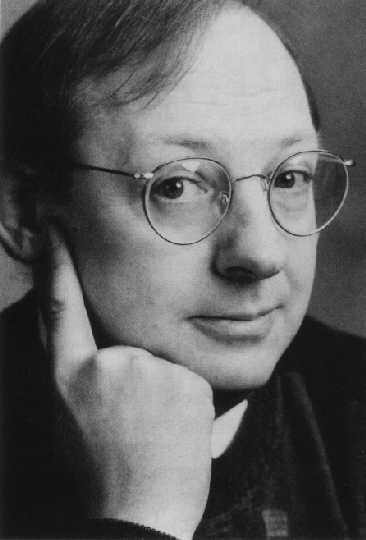 BD: Not to smooth it over?
BD: Not to smooth it over?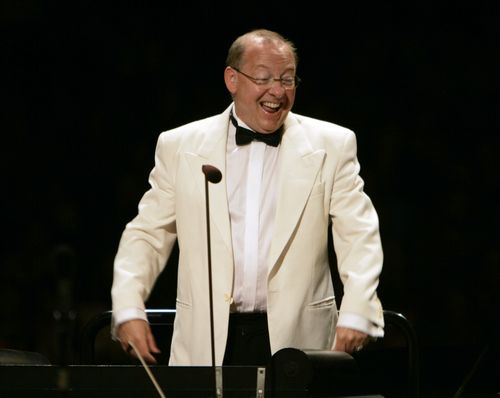 NM: So you have to practice it a lot! One
is concerned with making sure that one has the best classical violin
fingerings and where the shifts come, because it’s
slightly differently fingered from how it would be in a modern orchestra,
if one’s going back to do it as it would have been done in Mozart’s time.
But for something like Grant Park here, where I get two two-and-a-half-hour
rehearsals basically to throw a concert together, one is concerned only with
togetherness of performance, getting some kind of unified style for a piece
and working out the technically tricky bits. Then one really puts the
gas pedal down at the concert because there the players, after all, can take
it. They’re very tip-top professional players. And it’s pointless
trying to do a performance in a rehearsal; it’s a waste of good rehearsal
time. It’s much better to work out a complex piece of wind counterpoint
so that it actually balances, and then that balance will still stay the same.
But you can actually really give the concert some bite.
NM: So you have to practice it a lot! One
is concerned with making sure that one has the best classical violin
fingerings and where the shifts come, because it’s
slightly differently fingered from how it would be in a modern orchestra,
if one’s going back to do it as it would have been done in Mozart’s time.
But for something like Grant Park here, where I get two two-and-a-half-hour
rehearsals basically to throw a concert together, one is concerned only with
togetherness of performance, getting some kind of unified style for a piece
and working out the technically tricky bits. Then one really puts the
gas pedal down at the concert because there the players, after all, can take
it. They’re very tip-top professional players. And it’s pointless
trying to do a performance in a rehearsal; it’s a waste of good rehearsal
time. It’s much better to work out a complex piece of wind counterpoint
so that it actually balances, and then that balance will still stay the same.
But you can actually really give the concert some bite.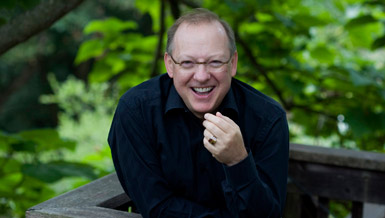 NM: I was playing second flute, and then harpsichord
when there wasn’t a flute part. So I got to play in a lot of those
— more symphonies than Mozart ever knew he wrote. It was a great, great
experience. I can’t honestly say that it was always great fun to make,
because you would sit there for two weeks at a time and just play into the
microphone. And things weren’t always done in sequence. We’d
sometimes have a morning of minuets, without knowing exactly to what symphony
they belonged! You did get a bit shell-shocked after a while, if you
do three slow movements in a morning. And we didn’t rehearse much.
NM: I was playing second flute, and then harpsichord
when there wasn’t a flute part. So I got to play in a lot of those
— more symphonies than Mozart ever knew he wrote. It was a great, great
experience. I can’t honestly say that it was always great fun to make,
because you would sit there for two weeks at a time and just play into the
microphone. And things weren’t always done in sequence. We’d
sometimes have a morning of minuets, without knowing exactly to what symphony
they belonged! You did get a bit shell-shocked after a while, if you
do three slow movements in a morning. And we didn’t rehearse much.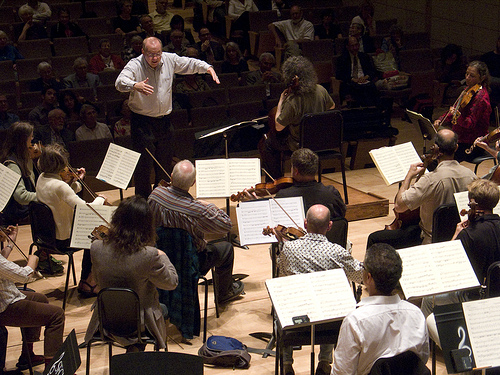 NM: Because I was asked to come and teach, that’s
why! I had just got divorced and I thought it was quite a good idea
to get out of London for a while, even if it was to Saint Louis, which I
ended up loving as a city! It’s not, perhaps, as exciting as Chicago,
but it’s one of those cities, like Pittsburgh, that doesn’t have the greatest
reputation, but if you actually live there it’s very nice.
NM: Because I was asked to come and teach, that’s
why! I had just got divorced and I thought it was quite a good idea
to get out of London for a while, even if it was to Saint Louis, which I
ended up loving as a city! It’s not, perhaps, as exciting as Chicago,
but it’s one of those cities, like Pittsburgh, that doesn’t have the greatest
reputation, but if you actually live there it’s very nice. 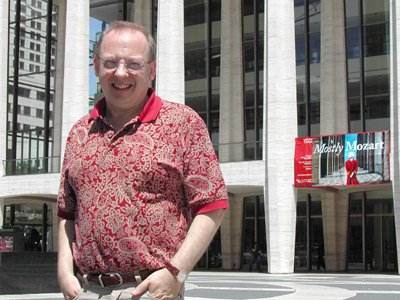 NM: There’s just no means of telling. There’s
a record that Monteverdi did rehearse an opera for six months. There’s
very good evidence with Bellini and Donizetti that they rehearsed an opera
as soon as it was finished, and sometimes beforehand. My gut reaction
is there’s probably about as many good performances now as there were then,
and probably about as many bad ones!
NM: There’s just no means of telling. There’s
a record that Monteverdi did rehearse an opera for six months. There’s
very good evidence with Bellini and Donizetti that they rehearsed an opera
as soon as it was finished, and sometimes beforehand. My gut reaction
is there’s probably about as many good performances now as there were then,
and probably about as many bad ones!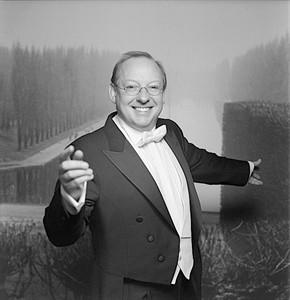 NM: [Smiles] Find one, yes... I think
there always is, in the arts, a certain sort of snobbism. If something
comes from Europe, it must be good. That’s absolute crap, or course!
It can either be good or bad no matter where it comes from. There are
plenty of players who come from Milwaukee who play a great deal better than
people who come from Paris, so I think that sort of snobbism is dangerous.
If something’s enjoyable, then it’s enjoyable. If it’s not, it’s not.
There was a very nice review in the New
York Times, I seem to remember, a couple of years ago, about a performance
by the Soviet Emigré’s Orchestra, or something like that, saying that
in terms of all that one knows about Bach, this performance was absolutely
awful, except that on its own terms, it was brilliant! They were using
vibrato and were playing Bach concertos on pianos, or something like that!
But they did it with such conviction that while it was going on, the fact
that it could be done in a totally different way — with
harpsichords and original instruments — is fine, but
the fact is, it doesn’t really matter if it was all ‘wrong’. The fact
is, it was very good! So the fact that one is using original instruments
or not using original instruments is neither right nor wrong. It’s
a question of whether it’s a good performance or not. A dull performance
on original instruments is a very dull affair!
NM: [Smiles] Find one, yes... I think
there always is, in the arts, a certain sort of snobbism. If something
comes from Europe, it must be good. That’s absolute crap, or course!
It can either be good or bad no matter where it comes from. There are
plenty of players who come from Milwaukee who play a great deal better than
people who come from Paris, so I think that sort of snobbism is dangerous.
If something’s enjoyable, then it’s enjoyable. If it’s not, it’s not.
There was a very nice review in the New
York Times, I seem to remember, a couple of years ago, about a performance
by the Soviet Emigré’s Orchestra, or something like that, saying that
in terms of all that one knows about Bach, this performance was absolutely
awful, except that on its own terms, it was brilliant! They were using
vibrato and were playing Bach concertos on pianos, or something like that!
But they did it with such conviction that while it was going on, the fact
that it could be done in a totally different way — with
harpsichords and original instruments — is fine, but
the fact is, it doesn’t really matter if it was all ‘wrong’. The fact
is, it was very good! So the fact that one is using original instruments
or not using original instruments is neither right nor wrong. It’s
a question of whether it’s a good performance or not. A dull performance
on original instruments is a very dull affair!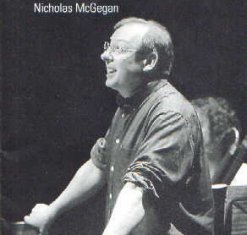 NM: Sure! You’ve got the complete run of Haydn
symphonies on modern instruments. You’ve got one that’s coming out
on original instruments, and a second one in the works. Plus Beethoven
symphonies galore and operas that are terrifically significant if you read
music history, but I never heard until after I’d managed to write many essays
on them! The possibilities for music students bluffing now is much
less than it was, and I think that’s a terribly encouraging trend.
I hope that doesn’t mean that now that there’s been
a performance of this Gluck opera there’ll never be another, because that
will mean that all this stuff will get stuck in the time warp with the 1980’s.
We might find in 2020, if I’m still around — that’s when my driving license
expires in England, so I hope I will be — that performances from today are
as quaint then as Mengelberg’s performances from the thirties are now.
They are wonderful in their own way, but we might find them very quaint.
One might find an authentic Saint Matthew
Passion just like terribly dry!
NM: Sure! You’ve got the complete run of Haydn
symphonies on modern instruments. You’ve got one that’s coming out
on original instruments, and a second one in the works. Plus Beethoven
symphonies galore and operas that are terrifically significant if you read
music history, but I never heard until after I’d managed to write many essays
on them! The possibilities for music students bluffing now is much
less than it was, and I think that’s a terribly encouraging trend.
I hope that doesn’t mean that now that there’s been
a performance of this Gluck opera there’ll never be another, because that
will mean that all this stuff will get stuck in the time warp with the 1980’s.
We might find in 2020, if I’m still around — that’s when my driving license
expires in England, so I hope I will be — that performances from today are
as quaint then as Mengelberg’s performances from the thirties are now.
They are wonderful in their own way, but we might find them very quaint.
One might find an authentic Saint Matthew
Passion just like terribly dry!|
Nicholas McGegan (Conductor, Harpsichord, Flute)
Born: January 14, 1950 - Sawbridgeworth, Hertfordshire, England The English keyboard player, flutist, and conductor, Nicholas McGegan, studied piano at London’s Trinity College of Music in 1968. He also learned to play the flute, specializing in the Baroque flute. He pursued his education at Corpus Christi College, Cambridge, receiving B.A. in 1972, and at Maagdalen College, Oxford, receiving M.A. in 1976. Nicholas McGegan was active as a flutist, harpsichordist, fortepianist, and pianist in London, where he was also professor of Baroque flute (1973-1979) and music history (1975-1979) and director of early music (1973-1980) at the Royal College of Music. Nicholas McGegan has been well known for his work as conductor of major symphony orchestras and opera companies worldwide. Equally at home with modern- and period-instrument orchestras, his repertoire ranges from Georg Frideric Handel and Antonio Vivaldi through Mozart and the complete symphonies of Beethoven to Richard Strauss and Benjamin Britten. Nicholas McGegan recently joined the artistic leadership of The Saint Paul Chamber Orchestra as Baroque Series Director to develop programs and engage artists for the ensemble’s popular Baroque Series. 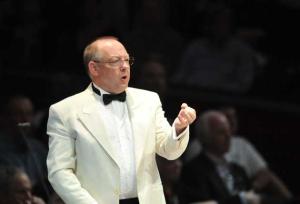 Since 1990, Nicholas McGegan has also been the Artistic Director of the Göttingen
Händel Festival, the oldest festival for baroque music in the world.
Under his directorship, the Festival has returned to presenting fully staged
performances of Georg Frideric Handel operas such as those that marked its
launch in 1920 and the revival of interest in that composer’s work.McGegan’s
recording of the Göttingen Ariodante with Lorraine Hunt Lieberson received
the Gramophone Award for 1996 in the category of Early Opera.
Since 1990, Nicholas McGegan has also been the Artistic Director of the Göttingen
Händel Festival, the oldest festival for baroque music in the world.
Under his directorship, the Festival has returned to presenting fully staged
performances of Georg Frideric Handel operas such as those that marked its
launch in 1920 and the revival of interest in that composer’s work.McGegan’s
recording of the Göttingen Ariodante with Lorraine Hunt Lieberson received
the Gramophone Award for 1996 in the category of Early Opera.In the fall of 1997, Nicholas McGegan made his début with Britain’s Royal Opera, conducting the world premiere of the Mark Morris production of Rameau’s Platée in London. In 2000, he took part in the opening season at the renovated Royal Opera House, conducting Mozart’s La Clemenza di Tito with Vesselina Kazarova among the cast. "The Mozart Experience," a recording of Mozart arias with him conducting the Royal Opera House Orchestra was released in 1998. For sixteen years, Nicholas McGegan was Music Director of San Francisco’s Philharmonia Baroque Orchestra (PBO) where he was recently named that orchestra’s Music Director Laureate, a position that allows him to expand his international commitments while continuing to direct the orchestra in major projects and a number of programs. During his tenure as Music Director, he helped establish the PBO as the leading original instrument orchestra in the USA and led them in regularly sold-out subscription seasons. In 1999 the PBO joined him at the Göttingen Händel Festival for performances of G.F. Handel’s opera Arianna and the ballet Terpsichore. Over the years, he and the PBO have collaborated on more than 30 recordings including a world premiere recording of G.F. Handel’s Susanna which received a Gramophone Award. Most recently BMG/Deutsche Harmonia Mundi released their recording of Thomas Arne’s Alfred and a recording of suites from Rameau’s Platée and Dardanus in conjunction with the enormously successful American premiere of Platée with the Mark Morris Dance Group. Nicholas McGegan is the founder-director of the chamber music group The Arcadian Academy, which specializes in music from the 17th and early 18th centuries, mostly by Italian composers. They tour regularly in the USA and Europe and have won several honors for their recordings. Their debut recording for Deutsche Harmonia Mundi - Scarlatti Cantatas with soprano Christine Brandes - was named "Recording of the Month" and "Editor’s Choice" by Gramophone magazine. The second CD in the Scarlatti series, featuring counte-tenor David Daniels, was released in October 1998 in conjunction with a world tour to Berkeley, Ann Arbor, New York, Vienna, London and Frankfurt. The group has received two Diapasons d’Or for their recordings of Nicola Matteis’ "Ayres for the Violin", volumes I and II. The third Scarlatti CD, featuring Brian Asawa, has been released. A CD of Scarlatti duet cantatas will appear next year. As guest conductor, Nicholas McGegan regularly appears with major symphony orchestras worldwide. Among those in the United States are the Atlanta, Boston, Detroit, Houston, Minnesota, Montreal, National (D.C.), New World (Florida), San Francisco, and St. Louis Symphony Orchestras and the Aspen, Grant Park and Ojai Festivals (he was music director for Ojai in 1988). Outside the USA, he has led the City of Birmingham Symphony Orchestra, the Academy of St. Martin in the Fields, the Orchestra of the Age of Enlightenment, as well as the Jerusalem Symphony, L'Orchestre de la Suisse Romande, the Swedish Chamber Orchestra, and orchestras in Lithuania, Hungary, Austria and Italy. In Australia he has worked with the Sydney, Melbourne, and West Australian Symphonies and in 1999 he made his first visits to Asia, conducting the Malaysian Philharmonic. He has a strong commitment to promoting young musicians and is a regular mentor to the New World Symphony and was head of the Pre-Classical Program at the Pacific Music Festival. Nicholas McGegan has conducted more than forty operas in Europe and the USA ranging from Monteverdi to Igor Stravinsky. These include the major Mozart operas, many by G.F. Handel, and also works by Haydn, Gluck, Rameau, Martin y Soler, Purcell, Landi, and Offenbach. From 1992- 1998, Nicholas McGegan was Principal Guest Conductor at Scottish Opera, and he was Principal Conductor at Sweden’s Drottningholm Theatre from 1993-1995, during which time he conducted his own edition of Philidor’s Tom Jones in conjunction with radio and television broadcasts. He has also conducted at the English National Opera in London, Santa Fe Opera, and Washington Opera. Nicholas McGegan has received an honorary degree from the Royal College of Music of London. He has been awarded the prestigious Händel prize from the Halle Händel Festival in Germany, and in 1996 was presented with the Drottningholmsteaterns Vänners Hederstecken, the honorary medal of the Friends of the Drottningholm Theatre. Nicholas McGegan’s recording contract with BMG/Deutsche Harmonia Mundi is adding a range of opera, orchestral and chamber music projects to a discography that already includes more than 70 recordings on BMG/Conifer, Classic FM, Decca, Erato, Harmonia Mundi USA, Hungaroton, Koch and Reference Recordings. Nicholas McGegan is on the advisory boards of the Maryland Handel Festival and London’s Handel House. |
This interview was recorded in Chicago on July 19, 1988. Portions
(along with recordings) were used on WNIB in each of the following two years,
and again in 1995 and 2000. This transcription was made and posted
on this website in 2009.
To see a full list (with links) of interviews which have been transcribed and posted on this website, click here.
Award - winning broadcaster Bruce Duffie was with WNIB, Classical 97 in Chicago from 1975 until its final moment as a classical station in February of 2001. His interviews have also appeared in various magazines and journals since 1980, and he now continues his broadcast series on WNUR-FM.
You are invited to visit his website for more information about his work, including selected transcripts of other interviews, plus a full list of his guests. He would also like to call your attention to the photos and information about his grandfather, who was a pioneer in the automotive field more than a century ago. You may also send him E-Mail with comments, questions and suggestions.